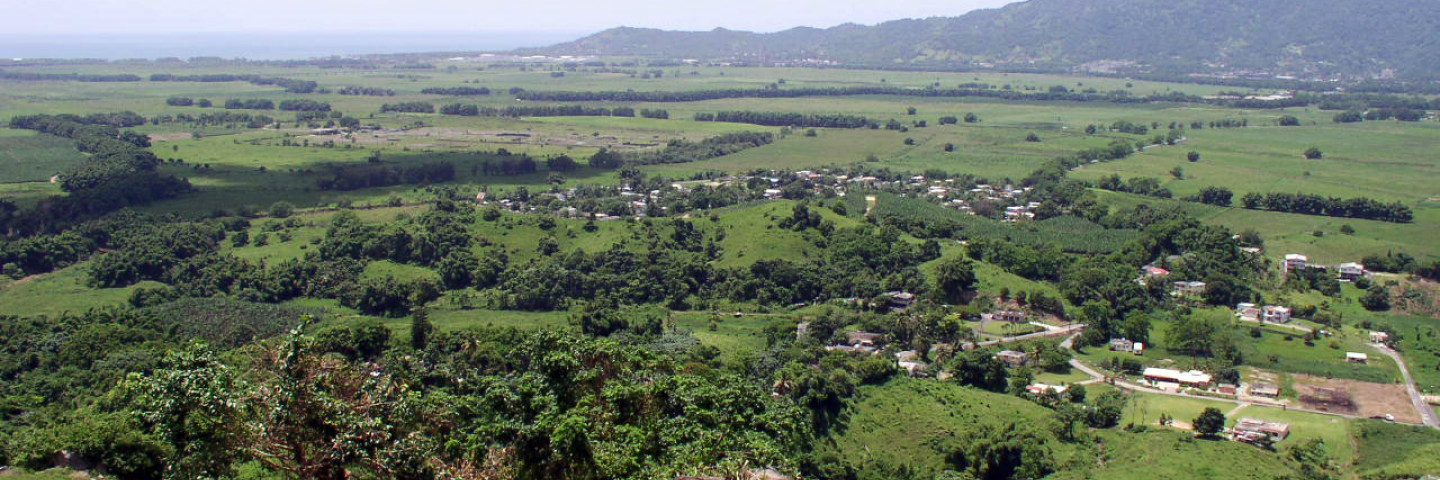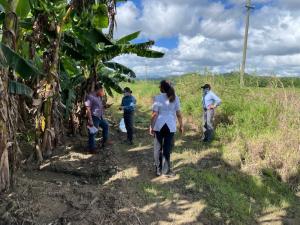
On January 15, 2015, the Caribbean Area NRCS unveiled its first Resource Conservation Partnership Program (RCPP) project funded through the 2014 Farm Bill. NRCS is working with Este SWCD and partners on the Yabucoa Agriculture Reserve RCPP to improve drainage and water flow and reduce flooding.
On January 15, 2015, the Caribbean Area NRCS unveiled its first Resource Conservation Partnership Program (RCPP) project funded through the 2014 Farm Bill. NRCS will work with the Soil Conservation District of Eastern Puerto Rico, the Puerto Rico Land Authority, the University of Puerto Rico Cooperative Extension Service, The Puerto Rico Department of Agriculture and the Municipality of Yabucoa on the Conservation Partnership Program for the Yabucoa Agriculture Reserve to improve drainage and water flow and reduce flood damage in the Río Guayanés floodplain. NRCS awarded $700,000 for this 5-year project to reduce severe and prolonged flooding, re-channel flood waters to Río Guayanés, eliminate stagnant water ponding and improve water quality in the watershed.
The Yabucoa Valley has an extensive history of agricultural production from the 19th century. Historically, the entire valley floor was planted in sugarcane. Currently, it is used mostly for dense pastures and plantain crops. Yabucoa had several sugar mills and farms during the sugar period; Hacienda La Lucía was one of the earliest sugar plantations. It was originally established in 1852 to grow and process sugar cane. The last sugar crops were produced by the old Hacienda Roig plantation, the last sugar mill in Yabucoa that closed in 2000.
The Yabucoa RCPP is targeting the use of conservation practices to manage runoff, flooding and ponding while controlling the seasonal high water table by planning critical area crop management, removing channel obstructions, and protecting heavy use areas. Partners are also considering adding additional grassed waterways, lined waterways and outlets, water control structures and sediment control basins. The project has established a collaborative framework between NRCS and Este SWCD to manage and control excess surface water and improve soil quality in the Yabucoa Valley Agriculture Reserve.

In September 2019 the Caguas Field Office signed the last financial assistance contract (three in total) under the Yabucoa Valley Agricultural Reserve RCPP initiative. In addition to reducing soil erosion and improving water quality and irrigation efficiency, it also help farmers in the project area to become more resilient by helping them to recover after major flood events by repairing and improving waterways. With the final contract signed, Este SWCD was able to begin the bidding process for practice construction. Several meetings were held with the District's contractors and NRCS engineers, resulting in more efficient practice design and better understanding of practice standards. The total NRCS contribution for this initiative is $508,793 for the implementation of conservation practices.

The NRCS Caribbean Leadership team met with Este SWCD members at the Yabucoa site (left) on Dec. 23, 2020 to discuss project progress. State Soil Scientist Manuel Matos discussed the importance of conducting wetlands and cultural resources inventories in the Yabucoa Valley. He explained how sugar producers in the 1800’s drained the valley to create a suitable area for sugar cane production. Historic data and photography show the man-made drainage system from the sugar period. State Resource Conservationist Mario Rodriguez described opportunities through RCPP to apply conservation practices to increase water infiltration and reduce runoff and nutrient and pesticide loss during heavy rain storms. SRC Rodriguez also identified the need to implement crop row arrangement to allow excess water to drain to existing channels. This will create a better environment for crop growth by facilitating more efficient use of water in graded furrow irrigation systems.
For more information about the Yabucoa RCPP, contact the Caguas Field Office at 787‐743‐2743 ext. 3.
For more information about RCPP please contact Javier Cruz at 787-281-4962 or javier.cruz@usda.gov.

